

Why Innovation Can't Fix America's Classrooms - Marc Tucker - National. Forget charter schools and grade-by-grade testing.
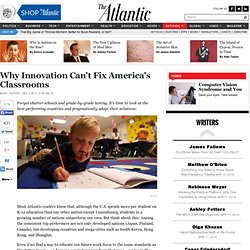
It's time to look at the best-performing countries and pragmatically adapt their solutions. Reuters Most Atlantic readers know that, although the U.S. spends more per student on K-12 education than any other nation except Luxembourg, students in a growing number of nations outperform our own. But think about this: Among the consistent top performers are not only developed nations (Japan, Finland, Canada), but developing countries and mega-cities such as South Korea, Hong Kong, and Shanghai. Even if we find a way to educate our future work force to the same standards as this latter group -- and we are a very long way from that now -- wages in the United States will continue to decline unless we outperform those countries enough to justify our higher wages.
Politics and Education Don't Mix - P.L. Thomas - National. Governors and presidents are no better suited to run schools than they are to run construction sites, and it's time our education system reflected that fact.
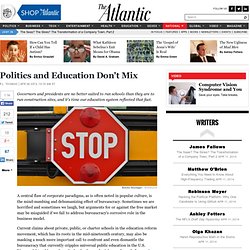
A central flaw of corporate paradigms, as is often noted in popular culture, is the mind-numbing and dehumanizing effect of bureaucracy. Sometimes we are horrified and sometimes we laugh, but arguments for or against the free market may be misguided if we fail to address bureaucracy's corrosive role in the business model. Current claims about private, public, or charter schools in the education reform movement, which has its roots in the mid-nineteenth century, may also be masking a much more important call to confront and even dismantle the bureaucracy that currently cripples universal public education in the U.S.
"Successful teaching and good school cultures don't have a formula," argued legal reformer Philip K. As government policy and practice, bureaucracy is unavoidable, of course. Texas Science – News from the College of Natural Sciences » Freshman Research Initiative. Everything You Know About Education Is Wrong - Jordan Weissmann - Business. A groundbreaking study of New York schools by a MacArthur "genius" challenges the typical understanding of what makes a good school.
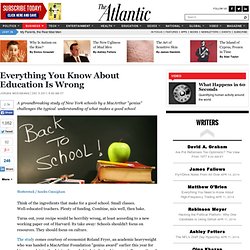
Our Universities: Why Are They Failing? by Anthony Grafton. The Faculty Lounges: And Other Reasons Why You Won’t Get The College Education You Paid For by Naomi Schaefer Riley Ivan R.
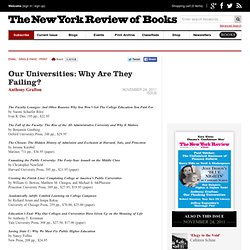
Dee, 195 pp., $22.95 The Fall of the Faculty: The Rise of the All-Administrative University and Why It Matters by Benjamin Ginsberg Oxford University Press, 248 pp., $29.95 The Chosen: The Hidden History of Admission and Exclusion at Harvard, Yale, and Princeton by Jerome Karabel Mariner, 711 pp., $36.95 (paper) The Forgotten Student: Has Higher Education Stiffed Its Most Important Client? - Laura McKenna - Business. How the prestige game costs students more money for a lower-quality education Wikimedia Commons In a much discussed op-ed in the New York Times, an executive director at Goldman Sachs, Greg Smith, skewered his company for rewarding traders who sold bad products to their clients, whom they nicknamed "muppets.
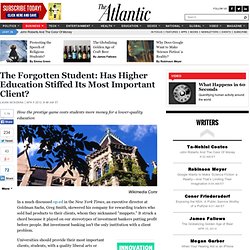
" It struck a chord because it played on our stereotypes of investment bankers putting profit before people. But investment banking isn't the only institution with a client problem. Universities should provide their most important clients, students, with a quality liberal arts or professional education at a reasonable cost for a finite period of time.
Not Trained To Teach. The Paradox of College: The Rising Cost of Going (and Not Going!) to School - Derek Thompson - Business. The most important issue in higher education might not be cost control.
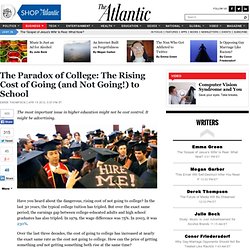
It might be advertising. Have you heard about the dangerous, rising cost of not going to college? In the last 30 years, the typical college tuition has tripled. Why Do So Many Americans Drop Out of College? - Jordan Weissmann - Business. Unprepared students sign up for school because they think a degree is their passport to the middle class.
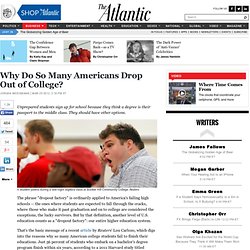
They should have other options. A student yawns during a late night algebra class at Bunker Hill Community College. America’s worst colleges. In the fall of 2010, three former students at Everest College, a for-profit career school in Salt Lake City, sued their school’s parent company, Corinthian Colleges, alleging that admissions officers had misrepresented both the costs of the school and whether class credits earned at Everest could be transferred to other educational institutions. A 13-page affidavit filed in the case by a former admissions officer, Shayler White, described a high-pressure recruitment process in which prospective students were barraged by phone calls multiple times a day and hustled through financial aid paperwork. With his employment contingent on meeting a strict enrollment quota, White made as many as 600 calls a month, and was, he said, instructed by his superiors to use bullying psychological tactics, to ask questions “designed at putting down the prospective student” and “making them feel hopeless.”
MIT Mints a Valuable New Form of Academic Currency - Commentary. By Kevin Carey The Massachusetts Institute of Technology has invented or improved many world-changing things—radar, information theory, and synthetic self-replicating molecules, to name a few.
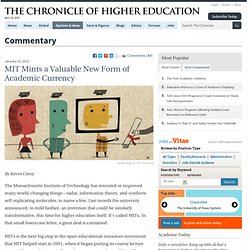
Last month the university announced, to mild fanfare, an invention that could be similarly transformative, this time for higher education itself. Why Are Finland's Schools Successful? It was the end of term at Kirkkojarvi Comprehensive School in Espoo, a sprawling suburb west of Helsinki, when Kari Louhivuori, a veteran teacher and the school’s principal, decided to try something extreme—by Finnish standards.
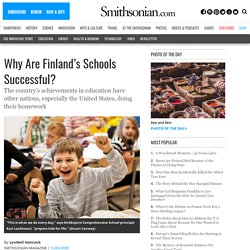
One of his sixth-grade students, a Kosovo-Albanian boy, had drifted far off the learning grid, resisting his teacher’s best efforts. The school’s team of special educators—including a social worker, a nurse and a psychologist—convinced Louhivuori that laziness was not to blame. So he decided to hold the boy back a year, a measure so rare in Finland it’s practically obsolete. Finland has vastly improved in reading, math and science literacy over the past decade in large part because its teachers are trusted to do whatever it takes to turn young lives around. What Americans Keep Ignoring About Finland's School Success - Anu Partanen - National. The Scandinavian country is an education superpower because it values equality more than excellence.
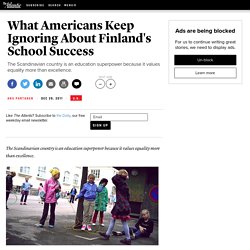
Sergey Ivanov/Flickr Everyone agrees the United States needs to improve its education system dramatically, but how? Carlos Fraenkel: Citizen Philosophers. Getting out of the cave and seeing things as they really are: that’s what philosophy is about, according to Almira Ribeiro. Ribeiro teaches the subject in a high school in Itapuã, a beautiful, poor, violent neighborhood on the periphery of Salvador, capital of the state of Bahia in Brazil’s northeast. It’s not just the truants bunking off education. Last week’s announcement that the government is to strengthen the state’s powers to impose tougher fines on ‘naughty parents’, who condone their children truanting, represents another nail in the coffin for both adult autonomy and education as a liberal and liberating cultural project. The practicalities, as suggested by government adviser Charlie Taylor - behaviour guru and ‘super-head’ of the Willows Special School in London - are as follows: parents of persistent absentees – that is, those who miss 15 per cent of school time per year – will be fined £60 (the previous rate was £50); if this is not paid within 28 days, the fine will double; if still unpaid, parents will either be taken to court or will have their child benefit docked.
What would Rousseau make of our selfish age? Few thinkers have left their fingerprints on the modern age as indelibly as Jean-Jacques Rousseau, the tricentenary of whose birth we celebrate on Thursday (28 June).. He was a philosopher who helped shape the destiny of nations, which is more than can be said for Pythagoras or AC Grayling. He was also a political visionary of stunning originality, a potent influence on the French revolution and a source of inspiration for the Romantics. Those who like their fiction drenched in lofty moral sentiment can also claim him as a great novelist. Much of what one might call the modern sensibility was this thinker's creation.
It is in Rousseau's writing above all that history begins to turn from upper-class honour to middle-class humanitarianism. Above all, Rousseau is the explorer of that dark continent, the modern self. The Value of Teachers. Why School Principals Need More Authority - Chester E. Finn Jr. - National. Under the current system, educational leaders have all of the responsibility but none of the power. Allowing principals to act like CEOs may foster a more efficient system. ecastro/Flickr A venerable maxim of successful organizational management declares that an executive's authority should be commensurate with his or her responsibility.
In plain English, if you are held to account for producing certain results, you need to be in charge of the essential means of production. In American public education today, however, that equation is sorely unbalanced. Why Inspiration Matters - Scott Barry Kaufman. Sources of illumination. Characterised by creativity and attuned to the needs of their age, the first European universities have important lessons for higher education today, says Miri Rubin. Occupy Kindergarten: The Rich-Poor Divide Starts With Education - Jordan Weissmann - Business. New research shows that a family's money matters ever more when it comes to their childrens' education Reuters Economic class is increasingly becoming the great dividing line of American education. The New York Times has published a roundup of recent research showing the growing academic achievement gap between rich and poor students.
It prominently features a paper by Stanford professor Sean F. Chomsky: How the Young Are Indoctrinated to Obey. April 4, 2012 | Like this article? Democracy and Education: On Andrew Delbanco. The Stanford Education Experiment Could Change Higher Learning Forever. Can Online Education Be Both Successful and Good for Us? - Kanyi Maqubela - Technology. We're witnessing the beginning of a much-needed revolution in education. Business - Conor Friedersdorf - Selling the College Experience to Students Who Take Classes Online. Professors without borders. 'The Single Biggest Change in Education Since the Printing Press' - Rebecca J. Rosen. A new joint initiative between Harvard and MIT demonstrates the schools' desire to open themselves up to more people. Homeschooling and unschooling among liberals and progressives. Educating Through Play: The Future of American Education.
The Roots of State Education Part 1: The Spartan Model. Thomas Jefferson on Public Education Part 2. Received wisdom. Rediscovering Literacy.